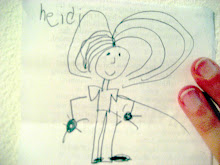I met with my mentor earlier this week, and I must say, she's pretty cool. I recently applied for a part time student librarian job at the public library, and when I showed up at the interview, it turned out my mentor was on my interview panel. So, I got the full de-brief afterwards on what I did right and what I did wrong.
First thing I did wrong: I didn't call my mentor right away. I guess I'm still getting a feel for our relationship. The turnaround time for applying was pretty tight, and it's just a part-time student job so the stakes seemed low. Okay, okay, even so, I should have called her. If she already knew she was going to be on the hiring panel, she wouldn't have been able to coach me on the interview, but if I'd caught her early enough, she could have given me the inside scoop.
It never occurred to me to list her as a reference because I haven't worked with her professionally. Of course, she pointed out that since she actually
works at the library where I was applying, the folks who would be looking at my application would recognize her name, and that could be enough to get my foot in the door. After that, it's up to me. Even though she can't speak to my on the job performance, she can act as a character reference. And her reference might even carry more weight since she's a known quantity to the people in HR. Even if all she could say is, "Yeah, she's a good egg," at least they have it from a reliable source that I'm not crazy.
The moral of the story is, if you have a mentor, be in touch! And if you don't have a mentor, get one. Check your local library association for a mentorship program, and if one doesn't exist, get one started. All it really takes is a few emails and maybe an Excel spreadsheet. Think of it this way...you'll have first pick at assigning your own mentor (though I'm a big fan of serendipity).
As for my performance at the interview...
Ms. Mentor commented on my appearance and said I looked nice, appropriate. By comparison, some people were a wee bit casual. All the men wore ties. No suit coats, but ties. I didn't wear a suit because I thought it would be overkill, but I did wear slacks and a button down. I was aiming to project "stylish and youthful, yet crisp and professional."
There was one question where I got a little "library school" and started to talk about an article that I'd read recently. She commented that it's good to mention that you're reading professional literature, it speaks to involvement and current awareness, but keep it brief. It's too easy to get wrapped up in describing the article and get sidetracked from answering the question. If you refer to something you've read, just say, "Oh, I recently read an article in
Library Journal that summarized that issue well." Period. Leave it at that.
On that note, if you feel yourself getting off track, it's perfectly alright to ask your interviewer to read the question again. Ms. Mentor told me a little secret she's figured out now that she's on the other side of the interview table. The people interviewing you want you to do well. After all, they want strong candidates to choose from, right? Chances are, they're mentally willing you the "right" answer, or at least the answer they're looking for. If you give them the chance to prompt you, they just might point you in the right direction (unless they're bound by specific union guidelines on how to conduct the interview). Follow up your responses by asking, "Does that answer your question?" or "Is there another aspect of that question that you would like me to address?" Put those reference interview skills to work!
I gave a weak answer to the last question. Honestly, I thought it was a little weird: How would your references describe your working style? My interpretation of what they were asking was thoroughly poisoned by all of the readings I've been doing on HR for school. I started to overanalyze the question and ended up completely misinterpreting it. Here's my thought process: What does my answer tell them about me? Well, it illustrates how I believe others see me, how perceptive I am at reading others. So, I tried to think of what qualities would stand out for each of the people I'd listed as references.
What were they really asking? They just wanted me to talk about my strengths. Lessons learned: be on the look out for simple questions reworded in complicated ways, and if you start to wonder what a question means, just ask!
I think the question that got me the job was the one about reader's advisory. I got excited, I talked about how my skills had developed over time, and it was all done with a great deal of sincerity. Evidently, I was rather charming. This was where I established a rapport with my interviewers, and this was where I convinced them that I was someone they wanted to work with.
So, I think I'm going to approach my next interview from a slightly different angle. Realistically, everyone who gets to the interview stage has the skills and qualifications to do the job. What they're looking for in the interview is someone who will do the job with
verve. I've got a couple of interviews next month, and the jobs are
dreamy, so the stakes are high. I asked a friend of mine for interview advice, and he told me, "Be as Heidi as you can be." Ultimately, I think that's the best advice anyone could give. I'm going to pack as much "me" into my answers as possible.
I'll be back with more interview questions soon. Fingers crossed!


